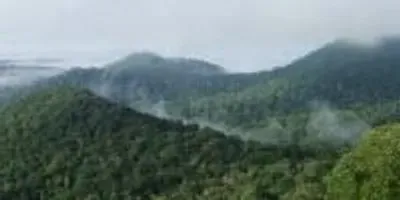 This is the Amazon rainforest—French GuianaPhoto credit: Dr. Sophie Fauset, University of Leeds
This is the Amazon rainforest—French GuianaPhoto credit: Dr. Sophie Fauset, University of Leeds
A focus on policies to conserve tropical forests for their carbon storage value may imperil some of the world's most biologically rich tropical forests, says new research.
Many countries have climate-protection policies designed to conserve tropical forests to keep their carbon locked up in trees. But the new study suggests these policies could miss some of the most diverse forests because there is no clear connection between the number of tree species in a forest and how much carbon that forest stores.
Lead author Dr. Martin Sullivan, from the School of Geography at the University of Leeds, said: "International programmes often encourage the conservation of forests with high carbon stocks, because their focus is to try to slow climate change. Until now, we didn't know whether these programmes would also automatically protect the most biodiverse forests. It turns out they probably won't."
Related Article: Study: Warming Could Slow Upslope Migration of Trees
A team of scientists from 22 countries measured both tree diversity and the amount of carbon stored in 360 locations across the lowland rainforests of the Amazon, Africa, and Asia. In each plot the carbon stored was calculated using the diameter and identity of every tree within a given hectare (2.5 acres). In total 200,000 trees were measured in the study.
The results, published in Scientific Reports, show that African tropical forests, spanning the Congo and West Africa store high levels of carbon, but are the least species rich. Forests in the Amazon and Asia, mostly in Borneo, have the greatest diversity of tree species, yet the Amazon tends to store less carbon per hectare than forests in Africa and Asia.
Co-author, Dr. Joey Talbot, also from the University of Leeds, explained: "In many ecosystems, sites with more species tend to lock up more carbon. But this doesn't work for tropical forests. Most tropical forests already have many species, and it may be that beyond a certain point adding even more species makes no difference to carbon stocks."
The study examined remaining intact tropical forests, the most biologically diverse ecosystems on the planet, home to half of all species. These forests also play a critical role in the global carbon cycle, storing 250 billion tonnes of carbon. Protecting them is essential—both to secure a future for millions of species, and to meet the global commitment of keeping temperature increases well below 2 degrees C.
Although biodiversity did not boost carbon storage, it could still be important in the long run.
Co-author professor Oliver Phillips, from the School of Geography at Leeds and leader of the RAINFOR forest monitoring network in the Amazon said: "We found some forests with fewer tree species storing a lot of carbon, while other very diverse forests had remarkably little. Yet the wonderful diversity of tropical forests, with millions of plant and animal species, is something we rightly celebrate. And now forests face rapidly changing climates, so conserving the full variety of life present could make a critical difference in allowing them to adapt."
Related Article: Large Forest Die-Offs Can Have Effects That Ricochet to Distant Ecosystems
Dr. Sullivan believes that careful consideration of biodiversity and carbon stocks can identify win-win scenarios. "Borneo, for example, is under extreme pressure from deforestation, but it's also a place where extremely high tree diversity and carbon stocks often coincide," he said. "A focus on protecting forests in Borneo would help both biodiversity and climate protection goals. Elsewhere, achieving both requires very careful planning."
Co-author professor Simon Lewis, also from the School of Geography at Leeds and founder of the AfriTRON forest monitoring network in Africa, added: "It's critically important to keep this carbon out of the atmosphere. But we need to remember that forests are more than just sticks of carbon. Local community uses, species diversity, and the many other values of forests should be taken into account to plan adequate conservation strategies for the 21st century. A simple focus on carbon is never enough."














